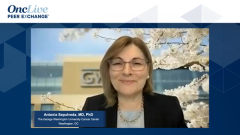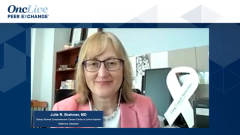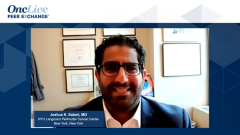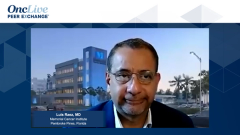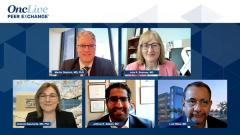
Treating MET Exon 14 NSCLC
The focus turns to therapeutic strategies for treating MET exon 14 non–small cell lung cancer.
Episodes in this series

Transcript:
Martin Dietrich, MD, PhD: Now switching into MET. Dr Sabari, brief summary, MET exon 14, obviously a developing space, tepotinib and capmatinib, 2 agents running side by side. Your thoughts on CNS [central nervous system] metastasis in a nutshell, what do we need to know and how do we apply them in the clinic? How do you choose?
Joshua K. Sabari, MD: MET exon 14 is common, 3% to 5% of our patients. As we mentioned, this is one of those unique alterations where upward of half of our patients have former or active smoking history. We know that these patients generally do have higher PD-L1 expression as well. A lot of controversy, whether IO [immunotherapy] is successful here or not. I tend to use capmatinib, 400 mg twice a day in the frontline setting. We’re seeing very high response rates, 70%, 80%, excellent intracranial activity. We saw a real-world update from Paul Paik, MD, recently showing an 85% intracranial response in a real-world patient population treated with capmatinib with active untreated CNS metastases. There’s a control arm of that as well, patients treated with IO in the frontline, only 11% intracranial response. I think in a patient with brain metastases, with MET exon 14 skipping, you have to use capmatinib in the frontline or tepotinib; both of them have great CNS penetration. The one sort of thorn in the side of these medicines is the tolerability. All patients essentially will develop lymphedema, lower extremity swelling that becomes quite pronounced and profound. I commonly dose reduce in older patients to 300 mg twice a day for capmatinib, do a lot of leg elevation, lymphedema massage, wrapping the legs. I have not found furosemide to be helpful here.
Martin Dietrich, MD, PhD: I think the adverse effect management is really dose reduction for the most part. I do want to say I share great excitement about MET. This will expand greatly in the EGFR progressor setting. And I think MET has more to offer than just the exon 14 skipping, and already NCCN guidelines supported for the amplifications. Very, very exciting field, and obviously for each patient, a unique find and a unique new opportunity.
Transcript is AI-generated and edited for clarity and readability.


